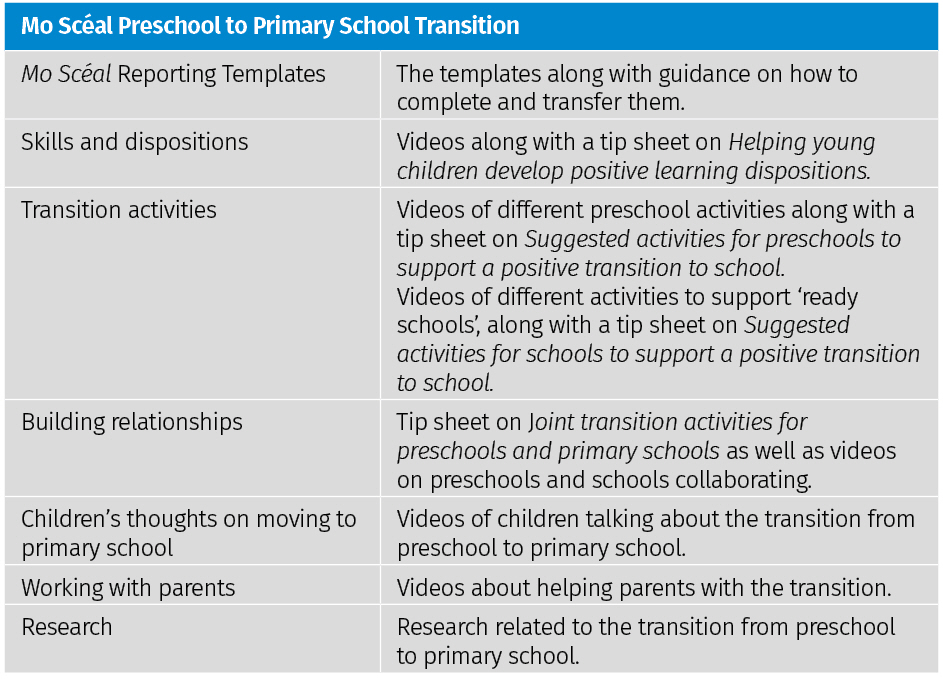

This article outlines the process behind publication of the NCCA’s Mo Scéal reporting templates. Mo Scéal means ‘My Story’, and the templates provide an opportunity to tell the story of the child’s interests, strengths, and challenges. The reports can be shared by preschools with parents and, with parents’ consent, with the primary school. The article also lists the types of resources provided by the NCCA to support this important transition.
The impetus for the National Council for Curriculum and Assessment’s (NCCA) work on the transition from preschool to primary school was ‘Literacy and Numeracy for Learning and Life: The National Strategy to Improve Literacy and Numeracy among Children and Young People 2011–2020’ (Department of Education and Skills, 2011). In the strategy, the NCCA was asked to develop online reporting templates to share information on children’s learning and development. As preparation for this project, the NCCA commissioned three research reports:
These are available at www.ncca.ie.
The research confirmed that a positive transition to primary school is a ‘predictor of children’s future success in terms of social, emotional and educational outcomes’ (O’Kane, 2016, p. 13). The key messages from the research reports are:
Following on from the research, the NCCA developed draft reporting templates. In 2017, the project team worked with a group of preschools and primary schools in a transition initiative that focused on the key messages from the commissioned research, along with piloting two draft templates. The NCCA collaborated with Comhar Naíonraí na Gaeltachta on the Irish-medium settings involved.
Everyone affected by the transition was involved in some way – children, families, preschools, and primary schools. Preschool practitioners and teachers were brought together for four workshops. The NCCA project team visited each preschool and primary school twice, and provided ongoing email and telephone support. Participant feedback was used to improve the draft reporting templates and to learn about the kinds of supports needed to facilitate the transition.
[ctt template=”2″ link=”Ra4i9″ via=”no” ]A positive transition to primary school is a ‘predictor of children’s future success.[/ctt]
Overall, the initiative was viewed as a very worthwhile, timely, and positive experience for all involved – families, practitioners, teachers, and the NCCA. The evaluation showed that the transition from preschool to primary school was a positive experience for most children. But it also spotlighted many challenges in supporting transitions, such as difficulties in building professional relationships, lack of time, and extra work (NCCA, 2018a). This replicated research findings both nationally and internationally (O’Kane, 2016; O’Kane and Murphy, 2016a, O’Kane and Murphy, 2016b).
The Mo Scéal reporting templates and accompanying support materials were published on the NCCA website at www.ncca.ie/earlychildhood in December 2018. Mo Scéal means ‘My Story’, and the templates provide an opportunity to tell the story of the child’s interests, strengths, and challenges. The reports can be shared with parents and, with their consent, with the primary school. At present there is no requirement for preschools and schools to use the Mo Scéal templates (NCCA, 2018b).
Mo Scéal templates have four sections:
[ctt template=”2″ link=”bndap” via=”no” ]Everyone affected by the transition was involved in some way – children, families, preschools, and primary schools.[/ctt]
The combined information in the document will give the teacher unique insights into the child’s learning and experiences from home and from preschool. This will be useful particularly in the initial weeks of junior infants.
The reporting templates are available in two formats. In each format, only Section 1: Practitioner is different. Template 1: Section 1 provides space for narrative descriptions based on Aistear’s four themes of Well-being, Identity and Belonging, Communicating, and Exploring and Thinking. Template 2: Section 1 provides ten statements related to each of Aistear’s four themes, accompanied by a 4-point rating scale. Sections 2, 3, and 4 are identical in both formats.
In addition to the templates there are lots of resources available on the NCCA website to support this transition. Table 1 outlines these.
Table 1: Templates and support materials

NCCA’s online publication of the Mo Scéal materials is timely given the publication of First 5: A Whole-of-Government Strategy for Babies, Young Children and their Families 2019–2028 (Government of Ireland, 2018), which has a strong focus on the transition from preschool to primary school. Going forward, as part of First 5, the NCCA will work closely with the Department of Education and Skills, the Department of Children and Youth Affairs, and relevant partners to develop guidance and pilot support processes for those focusing on this important transition.
Department of Education and Skills (DES) (2011) Literacy and Numeracy for Learning and Life. Retrieved from: www.education.ie/en/Publications/Policy-Reports/lit_num_strategy_full.pdf.
Government of Ireland (2018) First 5: A Whole-of-Government Strategy for Babies, Young Children and their Families 2019–2028. Dublin: Government Publications.
National Council for Curriculum and Assessment (NCCA) (2009) Aistear: The Early Childhood Curriculum Framework. Dublin: NCCA.
National Council for Curriculum and Assessment (NCCA) (2018a) Preschool to Primary School Transition Initiative. Final Report. www.ncca.ie/media/3367/transitionpreschoolprimary_reportfinalfeb.pdf.
National Council for Curriculum and Assessment (NCCA) (2018b) Mo Scéal: Preschool to Primary Transition. www.ncca.ie/en/early-childhood/mo-scéal.
O’Kane, M. (2016) Transition from Preschool to Primary School: Research Report 19. Report prepared for the National Council for Curriculum and Assessment. www.ncca.ie/en/file/early/ResearchReport19_LR.pdf.
O’Kane, M. and Murphy, R. (2016a) Transition from Preschool to Primary School: Audit of Policy in 14 Jurisdictions. Report prepared for the National Council for Curriculum and Assessment. www.ncca.ie/en/file/early/National-Audit-Draft-10.pdf.
O’Kane, M. and Murphy, R. (2016b) Transition from Preschool to Primary School in Ireland: Audit of Transfer Documentation in Ireland. Report prepared for the National Council for Curriculum and Assessment. www.ncca.ie/en/file/early/National-Audit-Draft-10.pdf.
Copyright © Education Matters ® | Website Design by Artvaark Design